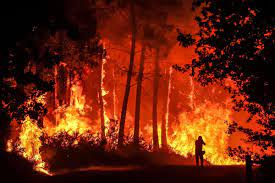As flames neared, guests at a beachside hotel on the Greek island of Rhodes picked up pails of pool water and moist towels, racing to assist staff members and locals put out one of the wildfires menacing Mediterranean areas during recent heat waves.
The swift teamwork meant that “by the time the fire brigade came, most of the fire actually was dealt with,” according to British visitor Elena Korosteleva who was staying at the Lindos Memories hotel.
Some uneasy visitors cut their vacation short the following morning, but the majority stayed there because the resort was unharmed by the little brush fire outside of its grounds.
After 11 days of deadly wildfires in July, the Greek island famous for its glistening beaches and historical buildings is still healing. It’s the same for other Mediterranean destinations, like Italy and Spain, where the tourism sector is also being hit by heat waves and wildfires. After thousands of people were evacuated during the height of travel season, Rhodes is considering how the crisis will affect its vital tourism sector, which fuels the majority of its economy and about 20% of Greece’s. According to estimates from the European Union, late-July fires that affected 120,000 people caused losses of more than 1,350 square kilometres (520 square miles) in Greece, Italy, Algeria, and Tunisia combined. And in the upcoming days, Greece is anticipating even more intense temperatures.
Hikers are still coming, according to the mayor of Villardeciervos town in north-west Spain, which was devastated by fires last summer.
Rosa Mara López said, “Tourism is likely to suffer a bit in the next few years, (whether) we want it or not. ”It is quite upsetting to observe that there are no trees on the hiking trails. But despite everything, tourists continue to place a great value on this region. We’ll need to adjust.
In severely affected areas of Greece and Italy, fires have driven away tourists. According to Olivier Ponti, vice president of analytics at ForwardKeys, a travel data company with access to airline industry ticketing data, Sicily is experiencing a similar trend to the widespread flight cancellations seen in Rhodes.
Italy hasn’t fared as well as Greece overall, which is fortunate. Wildfires “have caused a slowdown in bookings for many Italian destinations, even places not close to the fires,” he claimed, pointing to a decline for Rome in the final week of July.
Travellers may be put off by the summer heat even without the flames due to climate change.
Hotel owners in Benidorm, a popular vacation destination for Britons and Scandinavians, in south-east Spain are concerned.
Antonio Mayor, chair of the hotel and tourism organization in the Valencia region, which includes Benidorm, stated that “if heat waves were to be repeated every summer, the impact on our economy would be significant.” “The three months of the summer are when we are most active.”
That might result in travellers going north to places like the UK or the Scandinavian nations.
Tim Hentschel, CEO of online travel agency HotelPlanner, stated: “Record-setting temperatures in European countries like Greece, Italy, and Spain are not scheduled to ease up as we enter August, so it might be considered a much safer option to opt for a stay in northern Europe.”
The hottest month on record, according to the World Meteorological Organization and the EU’s Copernicus Climate Change Service, was July. According to scientists, recent heat records hint at things to come as the earth heats, including increased flooding, wildfires that burn longer, and catastrophic weather events that put people in danger.
Sensible Weather, a climate technology firm based in the United States, is creating insurance to provide compensation to consumers whose vacations are ruined by high heat.
In the UK, France, and the US, it has expanded “weather guarantee” coverage to travel agencies, which pays customers if heavy rain spoils a beach vacation or if there isn’t enough snow for a ski trip.
“In anticipation of next summer,” according to CEO Nick Cavanaugh, Sensible Weather will shortly include a heat cover option. Because they are considering these issues more, people are asking me more questions about it.
Although opinions on what constitutes “too hot” temperature vary, “in the simplest version, if it was 42 degrees Celsius (107.6 Fahrenheit) for three hours in the middle of the day and you couldn’t go out and do an activity, we could give you some money back,” he said.
In contrast to the record-breaking year of 2022, when about 2.6 million tourists, primarily from Britain and Germany, arrived on the Greek island, Rhodes had anticipated a rise in foreign arrivals of 8% to 10%. However, following the fires, more flights were cancelled in the final week of July than were booked in the comparable week in 2019, according to Ponti of ForwardKeys.
“We’re seeing more business every day,” he said. The resorts, which make up roughly 90% of the island’s 220,000 beds, “by Aug. 8-10, I think we’ll be back to our normal pace at all these resorts,” said the author.
“Some brave tour operators have already decided to bring customers from this coming weekend,” Markopoulos said of the devastated locations. Although it will take longer for these places to get back to normal, they still only make up a small portion of the island’s total capacity.
The week of July 17, when the flames started, saw a 76% decrease in new reservations for upcoming travel to Rhodes compared to the prior week. According to Ponti, they decreased by 10% for all of Greece.
Other low-cost airlines continued to offer seats and reported normal travel numbers, according to HotelPlanner’s Hentschel, while other large British operators briefly cancelled all Rhodes flights and vacations while offering refunds to customers who had made reservations for fire-hit areas.
Leading travel company TUI is once again selling vacations to all areas of Rhodes in Germany after it stopped flying visitors there.
Sebastian Ebel, CEO of TUI, told Germany’s dpa news agency that if no more tourists arrived following the forest fires, “We would do more harm to the people of Rhodes.”
Greek Prime Minister Kyriakos Mitsotakis provided an additional incentive by promising people whose Rhodes holidays were ruined by the fires a free week on the island next spring or fall on ITV’s “Good Morning Britain” this week.
The Rhodes visitor Korosteleva claimed that the fires should spur people to take action against climate change.
It informs individuals of the damage we have done to the environment and the possibility that this alteration cannot be undone. So it’s not just about tourism,” said Korosteleva, director of the Institute of Global Sustainable Development at the University of Warwick. I believe it makes evident how we should begin responding right away.

















